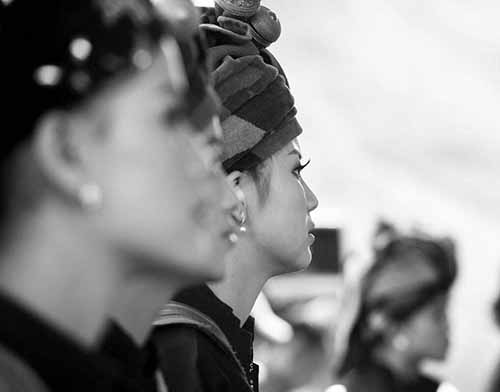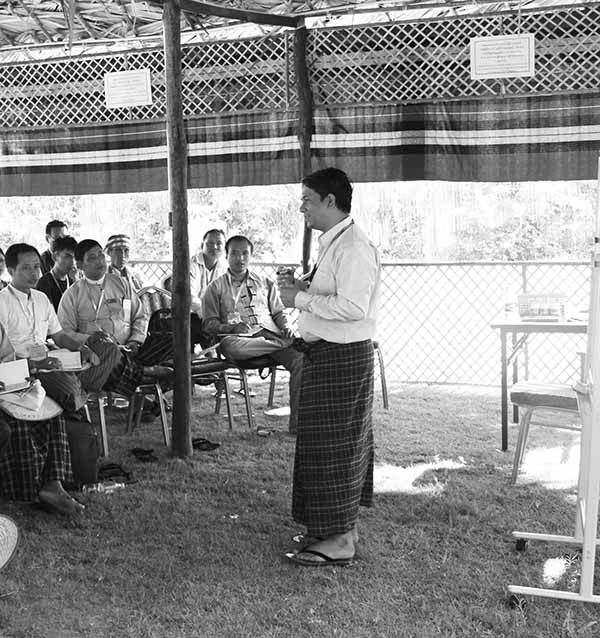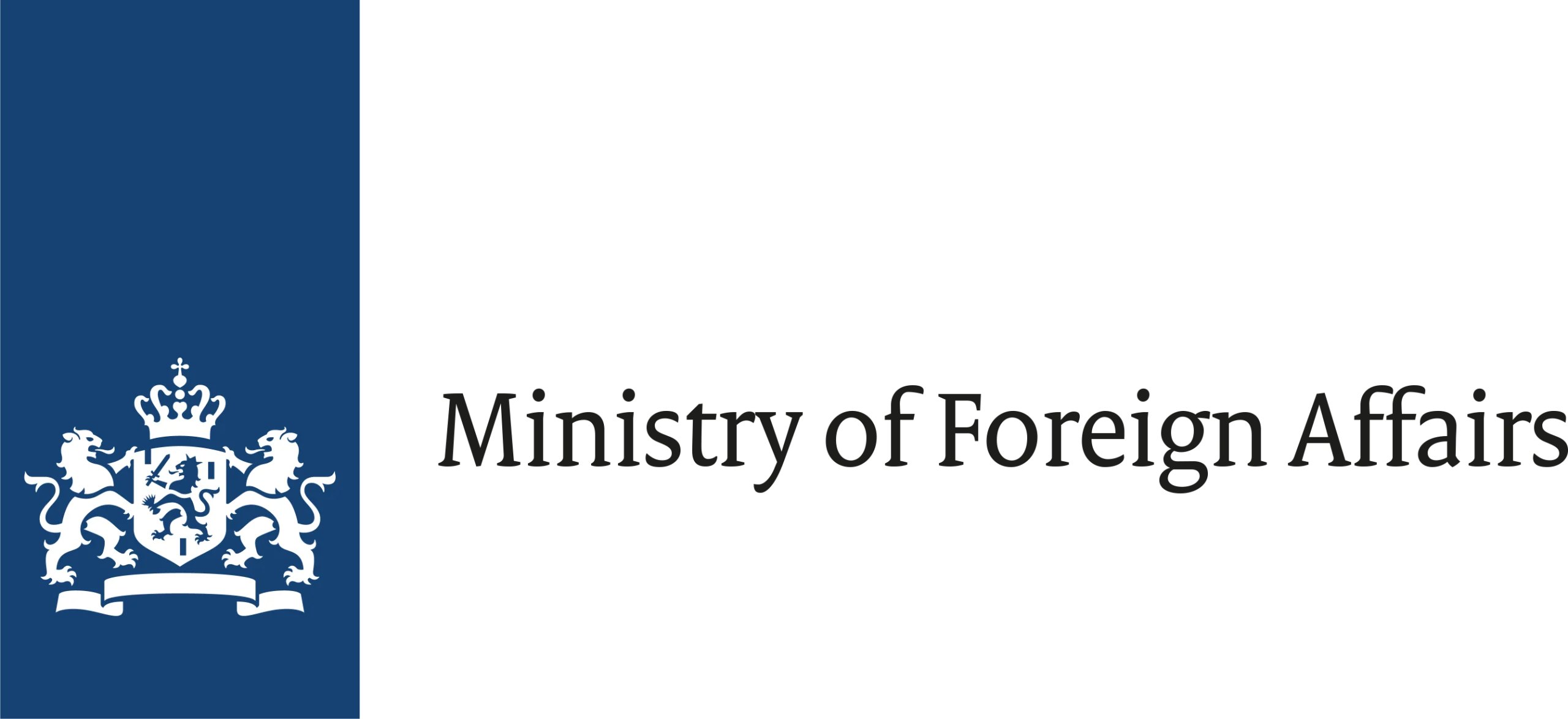Myanmar


- NIMD in Myanmar: At a glance
- What we do
- How we do it
- Meet the team
Main objective
Promoting dialogue, women’s political participation and a democratic culture, to help restore the democratization process that started in the years before the military coup of 2021.
Results
Myanmar’s military coup deepened divisions, leaving the country’s diverse political and ethnic groups unwilling to engage. Drawing on years of trust building, NIMD and Demo Finland have been able to bring together regional political and civil society representatives in monthly dialogue. The group has bridged divides, agreed on eight key principles for future laws, and advanced a peace and state-building agenda. A democratic Myanmar will depend on actors such as these, who champion collaboration, respect and dialogue. Read more.
The Women, Peace Ambassador Network – set up and supported by NIMD – is a growing group of lawyers, civil rights activists and political party members committed to championing gender equality and transforming mindsets within their own communities. Building on NIMD trainings, they have passed their knowledge on to over 1,000 community, youth and women leaders. Their cascading impact fosters inclusive communities, amplifies women’s voices, and strengthens Myanmar’s path towards a democracy where all voices are heard.
In 2023, we launched the MyDemocracy School App, an innovative and user-friendly online platform where youth, women and ethnic leaders from across the political spectrum can meet, learn and collaborate. With over 1,000 users – and growing – it provides a vital space for engagement and connection. In a challenging context, the app helps sustain our network’s hope and commitment to building a democratic future for Myanmar. Read more.
Myanmar: Political background
NIMD and our partner Demo Finland began working in Myanmar in 2014, during a period of hope as the country moved towards democracy. Elections in 2015 and 2020 led to a power-sharing agreement between the military and the National League for Democracy, the former opposition party.
But the gradual process of democratization was abruptly derailed in February 2021, when the military seized power. Today, the situation remains uncertain, with ongoing conflict between the military and ethnic groups, and severe restrictions on democratic freedoms.
In this multi-ethnic country, home to over 135 officially recognized ethnic groups, diverse religions and languages, the coup has deepened existing divisions and exacerbated tensions, destabilizing the fragile path towards democracy.
What we do
At NIMD, we maintain hope in a democratic future for Myanmar. While many organizations have been forced to halt their work in the country, our reputation as a reliable and impartial partner has enabled us to continue working towards democracy.
Our ability to persist lies in the trust we built with political parties, democracy activists and civil society organizations prior to 2021. Through our inclusive approach, we successfully bridged political and ethnic divides, creating spaces for dialogue and collaboration. In Shan State, for instance, our 2019 dialogue platform brought together twelve political parties to draft a food safety law, which was later adopted – a tangible example of the impact of inclusive dialogue.
Today, together with our partner Demo Finland, we continue to bring people together across divides to work on the foundations of a future democratic Myanmar. Our team’s deep understanding of the country’s political context enables us to design tailored programmes that enhance governance, foster dialogue and promote inclusivity.
Through dialogue, democracy education and training, we support youth, women, democracy activists, political actors and aspiring politicians of all ethnicities. Our aim is to restore the democratization process and nurture a generation of leaders who believe in and uphold democratic values in Myanmar’s politics.
Our reputation as a reliable and impartial partner has enabled us to continue working towards democracy.
What we do: In numbers
How we do it
Dialogue
Following the coup, at a time of widespread distrust and conflict, NIMD and Demo Finland recognize the power of dialogue to build trust and bridge even the deepest divides.
Building on our previous experience in Myanmar, we set up a regional multistakeholder dialogue platform. This quiet yet powerful initiative brings together a diverse group of local stakeholders from various political institutions and civil society organizations.
Critically, the impartial platform provides a rare safe space for open dialogue in a high-risk context, where such conversations are often silenced. To ensure the safety of participants, we introduced robust measures to maintain anonymity and security.
Each session is driven by the participants themselves, who propose topics and democratically select one for discussion. Common themes include decision-making, state- and peacebuilding; and equality for all ethnic groups. These conversations are not just about exchanging ideas – they are about fostering collaboration and keeping the spirit of democracy alive.
“Due to the intense suppression of political space in the country, all politicians were disconnected from political discussion and dialogue exchange. The dialogue has made me feel empowered and politically re-energized to keep working for my people again.” Dialogue participant
Encouraged by the success of the platform, we are now expanding this by setting up a new platform in another State, creating more opportunities for collaboration across divides. By fostering connections, building trust and reflecting on Myanmar’s path forward, these platforms help lay the groundwork for a future democratic transition. When that time comes, we hope to have contributed to shaping a new generation of leaders who value collaboration, openness and inclusion as the cornerstones of Myanmar’s democratic future.
"Our dialogue is not just about exchanging ideas –it is about fostering collaboration and keeping the spirit of democracy alive."
Women in politics
At NIMD, we firmly believe in the fundamental right of women to participate in peacebuilding and politics. We also know that women’s voices are critical for lasting peace and democracy, as they can bring unique insights into the root causes of conflict and the steps needed for long-term stability.
Yet in Myanmar, like in many countries, women face significant barriers to political participation. Our work to amplify their voices in politics and peacebuilding began in 2019, when we set up the State-wide Women Peace Ambassadors network. This growing network of lawyers, civil rights activists and political party members is committed to championing gender equality.
The Ambassadors actively engage their communities to raise awareness, transform mindsets and advocate for change. They lead trainings, raise awareness about women’s rights, and inspire other women to speak out. Many have become trusted leaders, taking on roles in resolving disputes.
“Men respect me now. They trust me and recognize my skills, giving me the space to step up as a community leader.” Women Peace Ambassador
We continue to support this network, offering opportunities to share knowledge, provide mutual support and coordinate collective action. We also organize networking events and training on topics including democratization, women’s security and conflict resolution.
“I now have ideas for resolving conflicts in my community and I feel confident to advocate for equal rights.” – Women Peace Ambassador
By supporting this network of committed leaders, we aim to build a more inclusive and equal political landscape in Myanmar – one where women play a central role in shaping the future of peace and democracy.
A cascade effect: The work of the Women Peace Ambassadors in numbers
Democracy Education
Since 2014, NIMD and Demo Finland have been running Democracy Schools in Myanmar, which aim to enhance the skills and knowledge of youth, women and ethnic leaders. Our Schools break down polarization and create a more open and inclusive political space.
When the coup struck, we adapted our Democracy Schools to prioritize safety and anonymity for participants. For participants across four States, we now hold monthly training on topics such as inclusive politics, federalism, and crisis management, alongside online seminars and advanced alumni programmes.
One priority of our Democracy School initiatives is to support our alumni: A network of hundreds of democracy advocates with the expertise and commitment to work together towards a democratic future. The coup has left many alumni feeling disengaged and disempowered. Through our app, alumni events and training, we strive to rekindle their energy, strengthen their connections and inspire hope for the future.
“In a time where there’s little hope amongst people in the country, this training gave me the motivation and renewed determination to keep on trying to find a way to pave a better political future for Myanmar” Democracy School participant.
Through all our Democracy School activities, we are working to forge a new generation of democrats who believe in and uphold democratic values in Myanmar politics.
Our work in action
The Women Peace Ambassadors have gained increased capacity to aggregate and voice their community’s interests. In August 2023, a Women Peace Ambassador took a leading role in arranging electricity for 450 households in her community. She organized community voices and engaged with the authorities at township and district levels.
Our Democracy School alumni are applying their new knowledge and skills to strengthen democratic values within their networks. For example, one alumnus launched a platform in early 2024 to collect and amplify the voices of marginalized communities in Myanmar. The platform advocates for inclusive politics and addresses inequalities.
"Our Schools have trained a network of hundreds of democracy advocates with the expertise and commitment to work together towards a democratic future."
Meet the team
 Htet Oo Wai
Country Director, NIMD Myanmar
Read more
Htet Oo Wai
Country Director, NIMD Myanmar
Read more
Htet Oo Wai is the Country Director for NIMD Myanmar.
 Wouter Dol
Head of Programmes & Knowledge
Read more
Wouter Dol
Head of Programmes & Knowledge
Read more
Wouter Dol is head of Programmes and Knowledge and is the focal point for the Myanmar team in the Hague.

Htet Oo Wai is the Country Director for NIMD Myanmar.

Wouter Dol is head of Programmes and Knowledge and is the focal point for the Myanmar team in the Hague.
Who we work with

NIMD’s work in Myanmar is funded by the Dutch Ministry of Foreign Affairs under the LEAP4Peace and Power of Dialogue programmes. The LEAP4Peace Consortium is made up of NIMD, the Burundi Leadership Training Program, the Gender Equality Network Myanmar, and Gender Action for Peace and Security, and supports women so they can play a meaningful role in political leadership, conflict resolution, and peace building.

Finland’s Ministry of Foreign Affairs, through Demo Finland, also funds NIMD’s Power of Dialogue work in Myanmar. The Power of Dialogue programme seeks to enhance collaboration among political and civic actors to influence accountable political processes.
 Facebook
Facebook